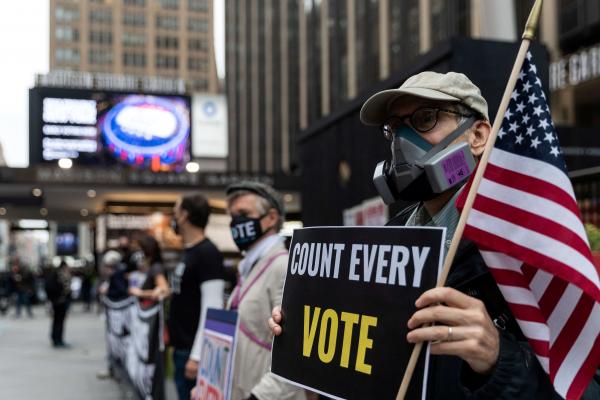According to new polling data from PRRI, 86 percent of Americans are concerned that there will be widespread violent protests in the aftermath of the upcoming election, revealing that both Republicans and Democrats share this fear. The survey — administered online and via phone calls — reached a random sample 2,538 adults representing all 50 states and the District of Columbia.
This month, President Donald Trump spoke to his supporters at a rally in Circleville, Ohio, about whether he would submit to a peaceful transfer of power:
“They ask me, ‘If you lose, will there be a friendly transition?’ Well, when I won, did they give me a friendly transition?”
“No!” his audience responded.
“They spied on my campaign, they did all this stuff,” Trump continued. “That was not a friendly transition.”
Republicans and Democrats disagree on who might carry out post-election violence. While 70 percent of Americans are somewhat or very worried that white supremacist groups will turn to violence, far more Democrats are worried about this particular group (89 percent) than Republicans (43 percent).
In the first presidential debate, Trump declined to condemn white supremacists, telling the Proud Boys — a far-right, anti-immigrant, all-male group — to “stand back, stand by.”
The role of religious leaders in de-escalating post-election violence
This year the Carter Center, which was founded by Jimmy Carter in part to ensure fair elections across the globe, turned their focus, in part, to U.S. elections. In an interview with NPR, Hrair Balian, director of the Conflict Resolution Program for the Carter Center, expressed that he never thought the center would have to direct its attention to the democracy of the U.S. They are currently working with local faith leaders to promote peace and calm. “What we fear is that guns, protests, and elections do not mix well," Balian told NPR’s Joel Rose.
The overwhelming majority of Americans surveyed (84 percent) by PRRI said they believe it is somewhat important or very important for religious leaders to “de-escalate anger before it turns violent” in the aftermath of the election, no matter the outcome. This sentiment remained consistent across denominational lines, and 79 percent of religiously unaffiliated Americans also expressed that local faith leaders should encourage de-escalation and peaceful protests.
On Election Day and election week, faith communities across the country have planned online prayer vigils and interfaith services. The Dominican Center at Marywood in Michigan will hold an election night “Peace Prayer Vigil” to “call on the wisdom from a Cloud of Witnesses who continue to inspire us and invite us to live nonviolently and to work for peace always. As votes are cast and as people stand in long lines, we pray for safety and just voting practices.”
The Episcopal Church will host a live-streamed “National Service for Healing and Wholeness” at the Washington National Cathedral on Nov. 1 led by Presiding Bishop Michael Curry. Amid “a pandemic, racial reckoning, and a historic election,” the interfaith service “will gather Americans for prayer, song, lament, hope, and a call to love God and neighbor.”
Got something to say about what you're reading? We value your feedback!





